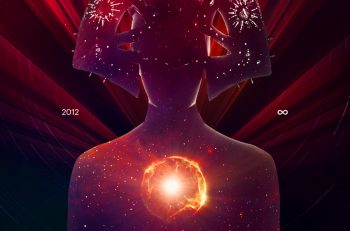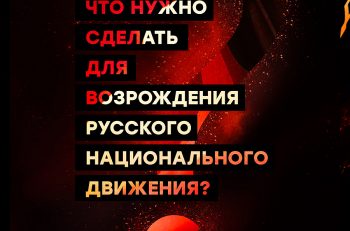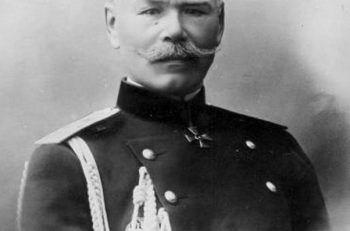Soft-spoken and with an ever-wistful look, if you watched or listened to him for the first time, you would probably be baffled why they call him a hero. On camera, he doesn’t exude charisma but rather appears exhausted and careworn. Nor does he talk like a silver-tongued politician but rather in a reserved and almost reluctant manner. You would ask yourself how this man has managed to lead thousands of people in the fight not for gold but for an idea. To turn what seemed a losing battle into months of resistance that is only growing stronger despite the necessary losses. To withstand an 84-day siege by a professionally trained army with nothing but a few rusty rifles and a World War II-era tank taken from a memorial. To keep fighting when it’s clear that the help is not coming. It’s the things done against all odds and in true faith that make him a hero.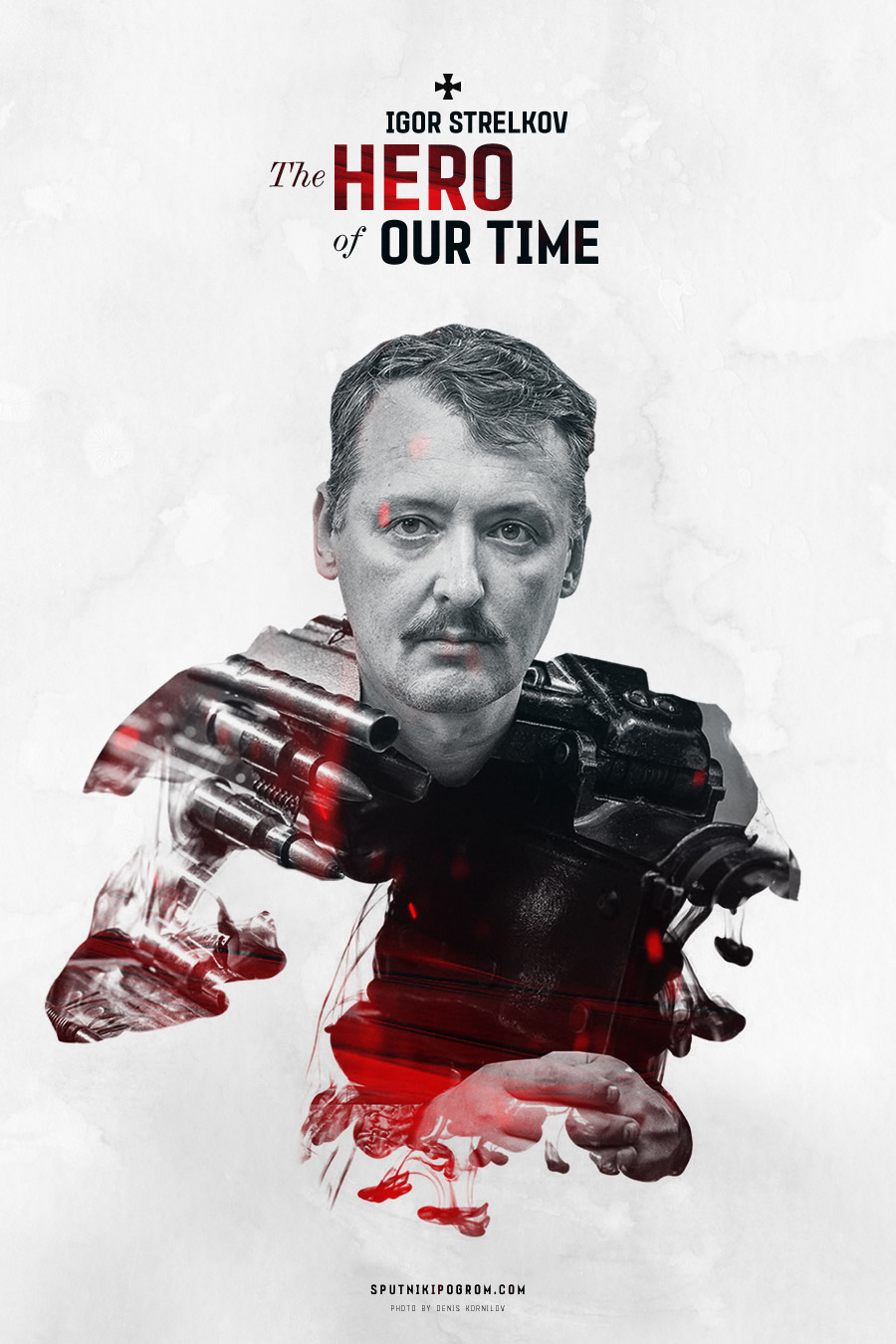
If we define a hero from a psychological point of view, a hero is, above all, a mentally strong individual, insusceptible to outside influences, able to overcome the situational uncertainty and pluralistic ignorance, analyse the situation amidst confusion and act accordingly, relying on the social norms and personal moral principles. After the anti-constitutional coup d’état in Kiev on February 22, 2014, the country was plunged into turmoil, and whilst many in the South-East region of Ukraine were discontent with the regime that came to power with the backing of their American puppeteers, neo-Nazi parties, and simply fanatics, everyone believed that there would be someone who would make a stand, anyone but themselves. Fortunately, such a man appeared. That man quickly gathered a group of like-minded locals in the small Ukrainian town of Slavyansk who were determined to go the extra mile in the fight for their right to remain who they are. That man’s name was Igor Strelkov.
Despite the common misconception, Strelkov was not deployed to the Donbass by Moscow as an agent (he retired from the FSB in the rank of Colonel on March 31, 2013), he was guided there by his sense of duty, justice, and fellowship, just like when he volunteered to fight for his people in Transnistria for five months in 1992 and Bosnia from October 30, 1992 until March 26, 1993. His peers describe him as “a noble and honourable man, devoted to his country.” One of his fellow soldiers in Transnistria recalls one time when Strelkov led a group of soldiers across the bridge under enemy fire in order to deliver ammunition to their comrades in Bender. At the time, he was only 22.
Raised in a family with several generations of military service, he has been passionate about military history since childhood. After he graduated from the Moscow Institute for History and Archives, he enlisted in the army and in a comparably short span of time gained the rank of Colonel, having served in multiple conflict zones over the years. In-between real wars, he became a prominent participant of historical war re-enactments. A convinced monarchist, he particularly favoured the role of a White soldier during the Russian Civil War re-enactments.
“He didn’t just play the part, he lived it,” reminisces one of the fellow re-enactors.
Whether it’s reading the comments that Igor Strelkov has left on various forums over the years, hearing about him from his friends and acquaintances, or closely watching him establish himself as the leader of the Donbass People’s Militia, we can see that before us stands a man of high integrity, strong will, and honour — a true Russian officer, ready to give life for his faith, his people, and his land.
“Whenever I talked to Igor, it always seemed as if this man had come from the past. His moral and ethical qualities are certainly not from this century,” says writer Mikhail Polikarpov.
In the last century, Russian society survived two massive strokes, with the second one leaving it paralyzed for the past 23 years. The first stroke — the Revolution of 1917 — sabotaged one of its cornerstones, Russian Orthodoxy, the cradle of Russian culture and system of ethics, as well as established the policy of positive discrimination against ethnic Russians. The fall of the Soviet Union, in its turn, resulted in the collapse of the last remnants of morals that were prevalent during the Soviet era. Following that collapse, Russian society has almost lost its identity. Today, it’s regaining it. Nostalgia for the bygone greatness, combined with the surge of patriotism that Russian society has experienced in the wake of recent events, has evolved into the Russian Spring. Russia is rising, and today, like never before, it needs strong leaders who will propel the foundation of the Russian State.
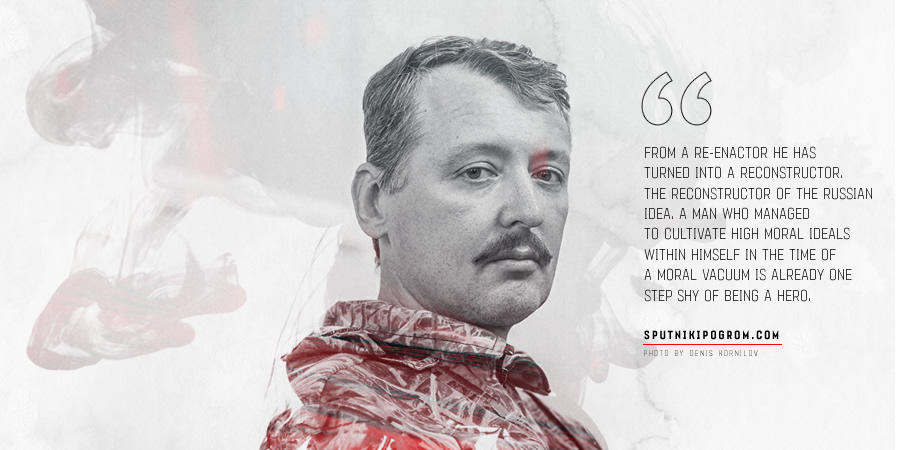
One such leader has already emerged. Igor Strelkov. From a re-enactor he has turned into a reconstructor. The reconstructor of the Russian Idea. A man who managed to cultivate high moral ideals within himself in the time of a moral vacuum is already one step shy of being a hero. Igor Strelkov crossed the Rubicon when he stepped into Slavyansk. For some, he has become a nightmare. For many, he has become a hero. The hero of our time.

